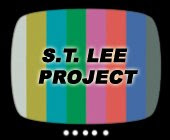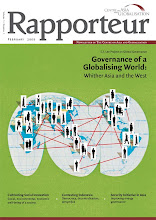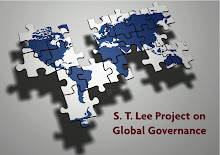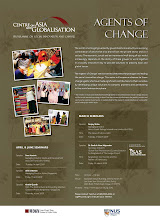Thursday, February 12, 2009
Two Old Presidents and Barrack Obama
Deep into January 2001, two children of former presidents took their oath. George W. Bush, the 43rd president of the United States, and Gloria Macapagal-Arroyo, the 14th President of the Philippines.
Both assumed their office in a cloud of legitimacy. He lost the popular vote to Al Gore, but after a protracted legal struggle in those unceasing Florida recounts, was awarded the presidency by five Supreme Court judges. She assumed hers through a second round of people power uprising, after which the unanimous pronouncement of twelve Philippine Supreme Court judges granted the Constitutional certainty of her ascension.
An egg pelted George W. Bush limousine on the way to the inaugural site. He raised his hand on the Capitol steps in Washington with thousands of protestors carrying placards that read, “Hail to the Thief!”
Gloria Macapagal-Arroyo raised hers at the Edsa shrine amidst a jubilant middle-class citizenry who congratulated themselves yet again for another presidential ouster. Meanwhile the poorer classes who awarded Joseph Estrada a landslide victory in the 1998 elections stayed away, sneering and hissing at the spectacle of a stolen presidency.
He had eight inaugural balls the night before his inaugural, all of them black-tie events. Hers was a four-day street party of savvy texters. Drunk with triumph, the urbanite protestors gyrated along the ten- kilometer stretch of Edsa to the music of the Ouster Band.
He is known to falter in the English language. The Brits call him “The English Patient” for the way he so badly needs remedial lessons. He massacres the words “nuclear” and “trepidation,” and could barely remember the names of heads of state during televised debates with his opponent. While Americans were nervous about having a “mentally-challenged” President, Filipinos were secure in the competence, at least linguistically, of theirs. After all, she has a PhD in Economics.
On the day America celebrated its new President, the weather sucked. It was bitterly cold in Washington on inaugural night of January 20th 2001. Rain had become snow. The next morning the new President woke up to a nasty winter storm.
At the other wide of the world on Saturday noon of January 20th 2001, the sun was brilliant and warm when Gloria Macapagal-Arroyo became the 14th president of the Philippines. The middle class of Metro Manila celebrated the triumph of another Edsa, their bodies standing tall, their hearts feeling stout again.
Fast forward to January 20, 2009, eight years to the exact same day. It’s bitingly cold in Washington DC, but the day is bright with the sun out. Somewhat like people power in Manila, an estimated two million people came to view the inaugural of the first African-American president, Barack Obama, except that this one stands solidly and firmly on Constitutional foundations. No pelting eggs, no booing, no hissing but a whole lot of cheering and clapping.
At a little past noon, the country definitively closed the page on the Bush presidency and opened a new one. The world watched the fifth youngest US president step into the most powerful office with an aura of near-invincibility, while Aretha Franklin sang as though her voice had been honed through many years of song for this one musical moment.
What makes presidential winners finally deserving of their office is not what they bring to the campaign but what they deliver to the electorate at the moment of their victory. Candidate Obama has won, and President Obama he has become. With his victory is the transformation of the nation itself, with aspirations bigger and better than all the different sentiments of the citizens combined.
Colin Powell aptly described Barack Obama as a “transformational figure.” Beyond this outstanding description lies a sense of deep faith shared by all, Americans and non-Americans alike, that the world can be re-made and that people can make better choices. Two million people stood outside to testify to this faith. Several millions more watched on television, as if the world was experiencing a Durkheimian “collective efflorescence”
Barack Obama embodies this faith. This was the source of his easy victory. To move us all along forward, resolutely. To forge ahead despite the burdens of an economic recession and a dangerous world with two raging wars. To wear power and strength, but graciously, much like the African adage that was Theodore Roosevelt’s favorite: “carry a big stick, but speak softly.”
The true task of the presidency, I submit, is a firm and resolute commitment to it, to ensure that the sacredness and sanctity that citizens have imbued the office with are preserved, if not expanded. Presidents become enlarged persons when wearing presidential shoes, because they are expected to assume bigger-than-life proportions. They must be transcendent of narrow desires and ambitions, free of the pettiness and vulgarity that grips ordinary people. President Obama is America’s redemption and America’s pride.
Meanwhile, two other presidents on opposite sides of the world --- one ex, the other an incumbent --- are competing for the title of the Most Unpopular President.
He’s back in Texas and hasn’t been heard from. No one from the global media seems to think it worthwhile to do a post-mortem.
She’ll still be around for another sixteen months. Filipinos have suffered her this long; perhaps it’s worth the wait, just to avoid another constitutional row. That’s assuming she doesn’t concoct some legal maneuver to prolong her stay. Which might mean another people power uprising, and thus elevate the practice as the country’s national pastime.
Like America, I prefer to keep my faith. [Tess]
This article was first published in Globalnation.inquier.com
Labels:
US Politics
Witnessing a movement
Like many Bangladeshis living overseas, I was energised by the US election, which produced a remarkable president and, as importantly, mobilised the young and old like no other political event in recent history.
Was it possible for such an election to occur in Bangladesh? I was sceptical. But, I flew to Bangladesh with hopes of being a part of history in the making. Thankfully, my scepticism was proven wrong. What I experienced was far beyond my fondest imagination.
On returning home and embarking on election work, I not only witnessed a remarkably orderly election process, but also had the feeling that it was just the most recent manifestation of a movement that is gripping the nation. I witnessed that the citizens cared about the election and wanted to make a difference through their votes.
Like my fellow citizens, I got swept into the wave of optimism and felt that anything was possible. Only when I stepped out of this wave did I realise that what I had experienced was a movement, a powerful movement that none of our political parties could have imagined gripping the nation after years of political, social and economic abuse of the people.
While I was basking in the warm glow from the excitement of the election process, I had another reason to feel good as I saw that the new cabinet would contain four women ministers. For the first time, our politicians realised that we needed women more than just as figureheads of the political parties.
Dr. Dipu Moni, whom I had the chance to meet a few weeks ago on the campaign trail, is the new foreign minister. My “chance meeting” with Dr. Moni took place in Chandpur at a Mukho Mukhi program organised by Shujon (Shushashoner Jonnyo Nagorik). This and many other Shujon programs gave me opportunities to meet the candidates.
As a proud participant in Shujon's democratic process, I sent Dr. Moni a congratulatory text message. Just think about thisI, an ordinary citizen, had the chance to actually speak with a potentially powerful candidate and then text her. If this is not a sign of a powerful new movement, I don't know what is.
There were a number of organisations that can take credit for bringing this new voice to the people. The social enterprises and not-for-profit organisations played their role in uplifting and empowering Bangladeshis over the past several decades. In this election, however, this empowerment was put to practice by entities like Shujon. Shujon collected information on all 1500+ candidates and organised over 80 Mukho Mukhi programs.
As a witness to the process, I can definitely say that Shujon's process of disseminating information and publicising its message of electing the “clean and right candidates” influenced many thousands of voters. My congratulations and gratitude to the more than a hundred thousand volunteers who worked tirelessly to make this process possible.
While the Americans celebrate the beginning of a successful grassroots movement initiated by a charismatic leader, we need to celebrate Bangladesh's successful grassroots movement initiated by its citizens. There was no one leader or party that mobilised the citizens. It was the people themselves.
Platforms like Mukho Mukhi allowed the people to speak up. In gatherings of several thousand people, women got up and asked the candidates what they would do for women, young people asked about job opportunities, and young/old all asked how clean the candidates would be. They were making clear to the candidates that they must serve the people.
This fire of citizen movement that has been ignited needs to be nurtured and developed. If not dealt with carefully, such a fire can become uncontrollable or die. The winning party not only has to live up to its election mandates but also has to listen to the millions of voices across the nation. In the US, President Obama's team is keeping the fire of his movement burning by creating “Organizing America.” We need to do the same.
Shujon, along with similar organisations, will continue to push along the democratic system by promoting: accountalibility of the elected officials; decentralised governance; grassroot participation in democracy; women's, children's and minority rights; youth involvement; and self reliance. However, all political parties need to become a part of this process.
The new government needs to work with community leaders to empower the citizens and mobilise them for good governance, social justice, clean politics and correct policies. It should with start communicating with the people.
Perhaps our leaders can take a page from the Obama book and keep the line of communication open with the people. Dr. Moni, I am looking forward to your response to my text to you! [Durreen]
This article was first published in The Daily Star.
Was it possible for such an election to occur in Bangladesh? I was sceptical. But, I flew to Bangladesh with hopes of being a part of history in the making. Thankfully, my scepticism was proven wrong. What I experienced was far beyond my fondest imagination.
On returning home and embarking on election work, I not only witnessed a remarkably orderly election process, but also had the feeling that it was just the most recent manifestation of a movement that is gripping the nation. I witnessed that the citizens cared about the election and wanted to make a difference through their votes.
Like my fellow citizens, I got swept into the wave of optimism and felt that anything was possible. Only when I stepped out of this wave did I realise that what I had experienced was a movement, a powerful movement that none of our political parties could have imagined gripping the nation after years of political, social and economic abuse of the people.
While I was basking in the warm glow from the excitement of the election process, I had another reason to feel good as I saw that the new cabinet would contain four women ministers. For the first time, our politicians realised that we needed women more than just as figureheads of the political parties.
Dr. Dipu Moni, whom I had the chance to meet a few weeks ago on the campaign trail, is the new foreign minister. My “chance meeting” with Dr. Moni took place in Chandpur at a Mukho Mukhi program organised by Shujon (Shushashoner Jonnyo Nagorik). This and many other Shujon programs gave me opportunities to meet the candidates.
As a proud participant in Shujon's democratic process, I sent Dr. Moni a congratulatory text message. Just think about thisI, an ordinary citizen, had the chance to actually speak with a potentially powerful candidate and then text her. If this is not a sign of a powerful new movement, I don't know what is.
There were a number of organisations that can take credit for bringing this new voice to the people. The social enterprises and not-for-profit organisations played their role in uplifting and empowering Bangladeshis over the past several decades. In this election, however, this empowerment was put to practice by entities like Shujon. Shujon collected information on all 1500+ candidates and organised over 80 Mukho Mukhi programs.
As a witness to the process, I can definitely say that Shujon's process of disseminating information and publicising its message of electing the “clean and right candidates” influenced many thousands of voters. My congratulations and gratitude to the more than a hundred thousand volunteers who worked tirelessly to make this process possible.
While the Americans celebrate the beginning of a successful grassroots movement initiated by a charismatic leader, we need to celebrate Bangladesh's successful grassroots movement initiated by its citizens. There was no one leader or party that mobilised the citizens. It was the people themselves.
Platforms like Mukho Mukhi allowed the people to speak up. In gatherings of several thousand people, women got up and asked the candidates what they would do for women, young people asked about job opportunities, and young/old all asked how clean the candidates would be. They were making clear to the candidates that they must serve the people.
This fire of citizen movement that has been ignited needs to be nurtured and developed. If not dealt with carefully, such a fire can become uncontrollable or die. The winning party not only has to live up to its election mandates but also has to listen to the millions of voices across the nation. In the US, President Obama's team is keeping the fire of his movement burning by creating “Organizing America.” We need to do the same.
Shujon, along with similar organisations, will continue to push along the democratic system by promoting: accountalibility of the elected officials; decentralised governance; grassroot participation in democracy; women's, children's and minority rights; youth involvement; and self reliance. However, all political parties need to become a part of this process.
The new government needs to work with community leaders to empower the citizens and mobilise them for good governance, social justice, clean politics and correct policies. It should with start communicating with the people.
Perhaps our leaders can take a page from the Obama book and keep the line of communication open with the people. Dr. Moni, I am looking forward to your response to my text to you! [Durreen]
This article was first published in The Daily Star.
Labels:
Social Entrepreneurism
Subscribe to:
Comments (Atom)









